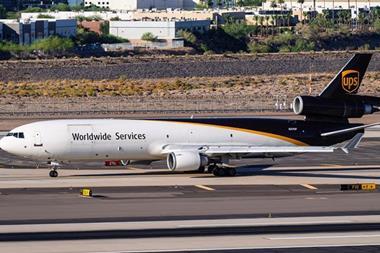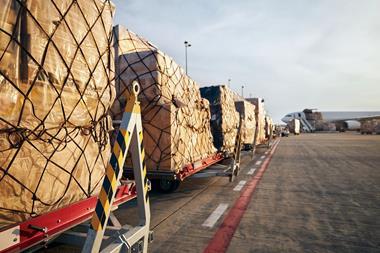The air cargo industry is bracing itself for the impact of measures taken to halt the spread of the deadly coronavirus in China.
Overnight, British Airways announced that it would suspend all direct flights to and from mainland China, with others expected to follow.
United Airlines, Cathay Pacific and Air Canada are amongst the other airlines that had already announced plans to reduce flight numbers.
Meanwhile, the Chinese government has extended the New Year holiday – a time when production in the country comes to a halt – by at least three days, until February 3.
Businesses in the Guangdong province, which includes Shanghai, have been ordered to remain closed through to February 10.
And the vast majority of flights into and out of Wuhan, the epicentre of the outbreak, were stopped last week.
It isn’t yet clear what impact this could have on air cargo, although supply chains are expected to be hit, with bellyhold air cargo capacity already reduced.
Meanwhile, there has been some suggestion that there could be a surge in demand when factories re-open.
Freight forwarder Westbound Shipping said that its staff in China would work from home, but supply chains would be affected as truckers, warehouse staff, cargo handlers, manufacturing staff would not be able to return to work for longer than expected.
It said that airfreight would be limited and therefore pricing would climb. It even warned that warehousing in Europe and the US could come under strain as companies look to build up inventory.
"The key is acting fast and pre-planning," it said.
Transport Intelligence practice leader Thomas Cullen said that the most significant direct effects will be felt on the air transport market and especially belly-freight services on passenger flights.
"Already there are press reports of a collapse in demand for domestic [passenger] services in China," he said.
"Presumably, freighter flights will be less affected. In other areas of transport, some barge and low-draft vessel traffic has been slowed into Wuhan’s river-port facilities but this does not appear to be severe yet.
"The indirect effects are likely to be as important economically. Already the price of oil has fallen.
"The impact on the exposed sectors of shipping and airfreight is obvious. The question is how long will the impact be felt and how deep will any fall in demand and prices be."
In contrast to Cullen's thoughts, airfreight rates climbed last week, although this could be down to a last minute surge ahead of the New Year factory closures.
Derivatives broker Freight Investor Services (FIS) pointed out that TAC Index data shows that week on week prices on services from Shanghai to Europe are up 9.2%, Hong Kong to Europe up 1.4%, Shanghai to Amsterdam up 19.4%, Shanghai to London up 4.3%.
FIS said that if other airlines follow the move by British Airways, resulting in reduced bellyhold capacity, demand for freighters could increase.
"The effect on prices is as of yet unknown, volumes are seasonally low and will be hit by factory closures and quarantine measures," FIS said.
"Freight businesses should pay close attention to any subsequent back-log of volume that will be released into the market if and when quarantine measures have been retracted.
“The effects of manpower restrictions caused by quarantine measures in China are also unknown, however likely to cause further volatility.”
ACI issues advisory bulletin in response to coronavirus outbreak
FedEx joins efforts to help fight the spread of the coronavirus
Freight booking portal Freightos said that any backlog caused by the extended closures could “motivate some time sensitive importers to shift modes from ocean to air”.
“An extended shutdown would likely push that rebound in demand and prices beyond the seasonal norm for ocean, and perhaps even more so for air as some shippers choose to expedite delivery of backed up orders,” the portal explained.
Meanwhile, forwarders have warned that the closure of their offices in China will be extended in line with the extended New Year holiday.
“Our offices will open after the extended holidays. In the meantime essential staff will attend our Shanghai office, as needed and other team members will work remotely,” Norman Global Logistics said.
“There is no evidence that coronavirus can be transferred on cargo, which means that contamination will not spread to the UK on freight.
“We are monitoring the situation closely and will publish new information on our website and social feeds, as it becomes available.”
Cullen said that Wuhan is a significant hub for road and air, but more so for rail and river transport.
"Its position on the Yangtze gives it an important role in handling cargoes from central China in and out of the ports of Shanghai," he said. "Removing it from China’s transport network may be difficult and disruptive but there are other options to move people and freight around China."
As of this morning, more than 130 people have died as a result of catching the virus, there are 5,974 confirmed cases and it has spread to at least 16 other countries.
The Chinese National Health Commission (NHC) has said it could be another 10 days until the outbreak peaks.
According to the Civil Aviation Administration of China (CAAC), Wuhan Tianhe Airport was the country’s sixteenth most busy in terms of cargo, handling 221,576 tonnes.
The city has a large industrial zone where high tech, automotive and pharma products are made, amongst others.















